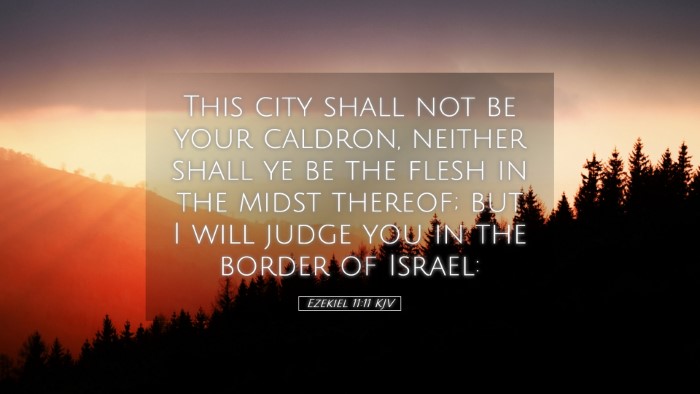Bible Commentary on Ezekiel 11:11
Ezekiel 11:11: “This city shall not be your cauldron, neither shall ye be the flesh in the midst thereof; but I will judge you in the border of Israel.”
Contextual Background
This verse appears within a section of Ezekiel where the prophet is addressing the exiles in Babylon. They are troubled by feelings of abandonment and have a strong connection to Jerusalem, which they view as their spiritual and cultural center. The "city" referred to is Jerusalem, while the "cauldron" metaphorically represents a place of safety and sustenance. However, this assurance is turned to a warning by God through Ezekiel.
Thematic Analysis
- Judgment and Accountability: The phrase “I will judge you” emphasizes God's authority over His people and their accountability. This can be interpreted as a divine call for self-examination among the exiles, reminding them that their actions are subject to God's scrutiny.
- Separation from Jerusalem: The prophetic message signifies that the exiles are not to consider themselves safe merely because of their connection to Jerusalem. Their identity as God’s people is not tied to the physical city but to their faithfulness to Him.
- The Metaphor of the Cauldron: The cauldron indicates a place of protection and nourishment. However, the mention that they would not be the flesh in the midst signifies that their role is not to be complacent but to engage in genuine faith and true worship.
Insights from Commentaries
Matthew Henry's Commentary
Matthew Henry highlights that in this passage, God is calling the Israelites to recognize their false sense of security. He reflects on the idea that although the city is seen as a cauldron for them, where they might believe they are safe from impending judgment, it is actually a false illusion. Henry points out that even in their trials, God’s purpose is to refine them rather than destroy them. The cauldron here is a reminder that we must not rely on external appearances of safety and community but on the true relationship we have with God.
Albert Barnes' Notes on the Bible
Albert Barnes stresses the distinction between true and false security. He clarifies that the cauldron metaphor was one of hope, but God is clearly dispelling this myth. He comments on the implications of being judged at the "border of Israel," signifying that their fate will be determined by their fidelity to God and not merely by geographical ties or historical attachments. Barnes underscores the necessity for the Israelites to realign their focus from a false security in their surroundings to a true dependence on God's providence.
Adam Clarke's Commentary
Adam Clarke extends the application to Christians today, indicating that the message bears significant relevance. He discusses the implications of being judged not in the place of presumed safety but rather at the borders, suggesting a spiritual dimension of separation from the divine. Clarke also indicates that this verse serves as a caution against complacency, urging believers to actively engage in their relationship with God rather than relying on communal heritage or tradition. He reminds readers that spiritual safety and community are cultivated through obedience and faithfulness.
Theological Reflection
This verse compels theological reflection on the nature of God's judgment and mercy. The transition from a posture of security to one of vulnerability encourages a reassessment of what it means to be chosen by God. It speaks to the broader theme of the Old Testament that emphasizes God’s desire for a relationship rooted in faithfulness, rather than mere location or heritage.
Practical Implications
- Self-Examination: Both pastors and congregants are called to evaluate their relationship with God beyond mere religious practice.
- Avoiding Complacency: The Church must actively seek the presence of God rather than assume safety based on traditional ties or past experiences.
- Commitment to Faithfulness: Believers are encouraged to express their identity as God’s children through righteous living and obedience.
Conclusion
Ezekiel 11:11 serves as a profound reminder for the people of God. It challenges them to discern their true standing with God, urging them to move beyond mere geography and heritage into a living, responsive relationship with Him. As the Church navigates modern challenges, these insights remain vital for sustaining a faithful community in Christ. In the journey of faith, security lies not in the outward symbols of faith, but in the inward commitment to live according to God's will.


